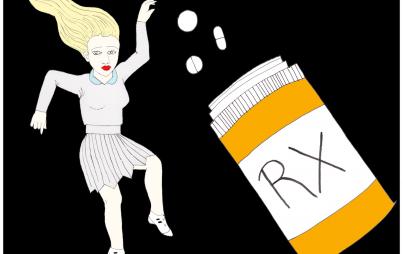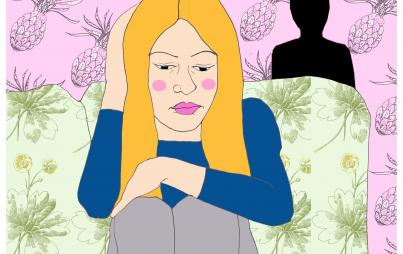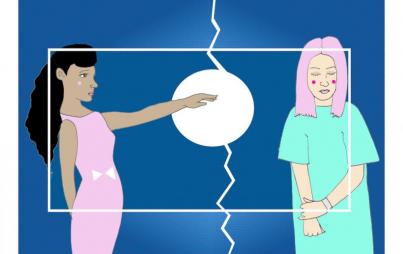
Addiction to books? It's possible.
Does the thought of being single make you ill? Do you feel like you’re not yourself without makeup on? Does the thought of taking a social media vacation make you want to glue your phone to your hand? You may have addictions that might not seem so obvious on the surface, but that are having adverse effects on your life.
When someone talks about addiction, most of the time they’re referring to alcohol or drugs. While, yes, drug and alcohol addictions are serious and deserve attention, those are far from the only substances one can develop an unhealthy, obsessive relationship with. For instance, take my addiction to reading...yes, you read that correctly. My name is Erin and I’m addicted to books.
This might sound confusing, but I’ll explain the obvious question about how someone can be addicted to reading. In one of my sessions with my life coach, we were discussing my relationship with books. I often will start a new book when I want to ignore a nagging problem in my life, mitigate any discomfort I feel in a social setting, or even when I want to just feel better after a shitty day. But she helped me to realize in our discussion that my relationship with books was rooted in my deep, core issues of fear of rejection and coping with trauma, as this habit of mine only picked up speed after two major traumatic events in my life in my early teens. Suddenly, I found myself hoarding books, reading literally as much as I could possibly take, and desperately looking for new information.
This behavior probably appeared to be healthy on the surface — what bookish teenager is going to be looked down upon for reading a lot? But underneath this obsessive behavior was me covering up my own shame. I used (and still use) books as a defense and coping mechanism to shield myself from others and also giving me protection. It’s why the thought of leaving the house without a book a few weeks ago seemed like it was impossible. And in my mind, it was.
While reading is my unhealthy addiction, it’s certainly not the only thing you can use in an addictive manner; almost anything can become addictive. Because our society looks at addictive behaviors in such a black and white way, those of us who live in the gray area are either ignored, praised, or looked at indifferently. I would invite you to open the door in looking at the things that you might be using addictively, or, at the very least, in an unhealthy way. Do you have to go to the gym twice a day? Does the thought of being single make you ill? Do you feel like you’re not yourself without makeup on? Does the thought of taking a social media vacation make you want to glue your phone to your hand? You may have addictions that might not seem so obvious on the surface, but that are having adverse effects on your life.
Here are a few ways you can do some inventory on your own behaviors and start dealing with addiction in a healing way.
1.Stop The Shame And Guilt/Engaging The Cycle
Most addictions have two common components to it that work in a feedback loop: shame and engagement. When you feel shame, you are most prone to engage in addictive behaviors and also probably feel some level of shame about them. Thus, both of these types of shame lead you to engage in the addictive behaviors even more. In order to end it, you’ve got to break the cycle. Don’t feel guilty about hitting the pavement if you’re addicted to working out — instead, observe your behavior and get curious about it. Guilt will only further perpetuate the cycle. Also, when you feel that impulse to engage in the behavior, ask yourself what you’re avoiding or trying to escape from and how or what you could give that to yourself instead of that addictive thing/behavior.
2. Try Something New
In order to break your old patterns, you need to start trying new things to take the addictions place. For me, leaving the house without reading material seemed awful, but once I started to do it, I found I was a lot more engaged in what was going on around me and found new ways to entertain myself on the go. Similarly, look at how the behavior is holding you back and try to alter your interaction with it in some way.
3.Talk About It
Since most addiction has underlying shame, people don’t discuss it. Even writing about my reading addiction took a lot of guts and I still worry about people thinking I’m weird or crazy. But, I’m talking about it anyway! Find an outlet that feels safe and comfortable for you and start to open up about your behaviors. I guarantee other people can relate.
4. Turn The Stone
Look at the emotions underneath your addictive behavior. Identify the initial cause and start to address those core issues. Every solution that doesn’t address a core issue is a Band-Aid, and we all know that Band-Aids eventually fall off. Stop the process of temporarily covering up the issue and look at it square in the face instead. I would advise working with a counselor or therapist on this step, since this is what they are trained to do.
5. Give Yourself Time
Listen, addiction takes a long time to prosper and a long time to unravel. Don’t think that this process is going to happen overnight or even by next week, because you’ll be sorely mistaken. Don’t put deadlines or timeframes on this healing and instead allow the process to happen, as it should. By letting go of your ego’s expectations, you’ll be allowing new self-love into your life that will help you to transform.







